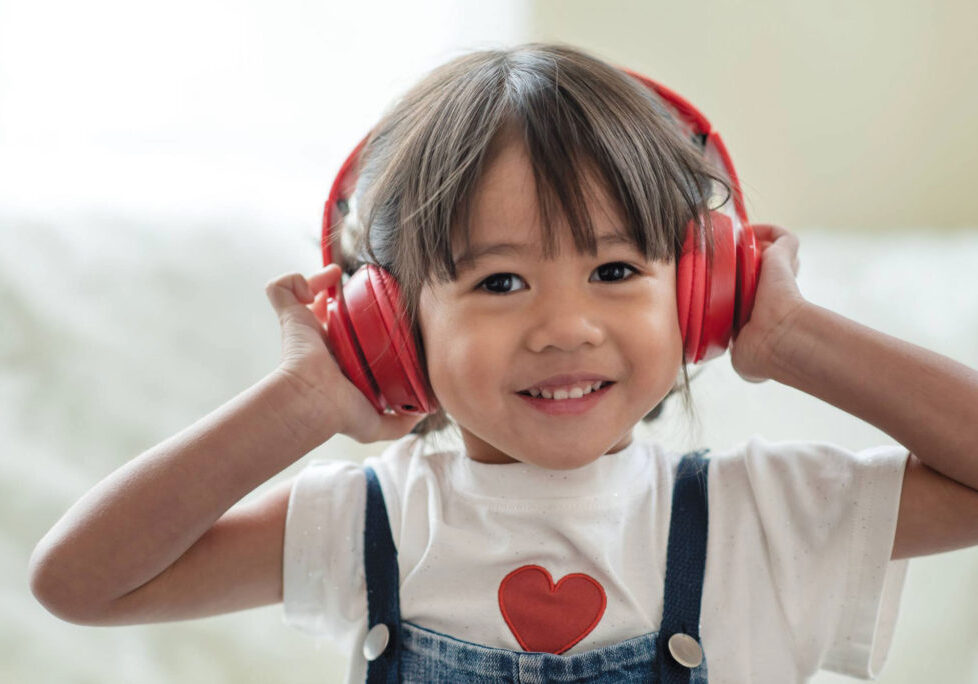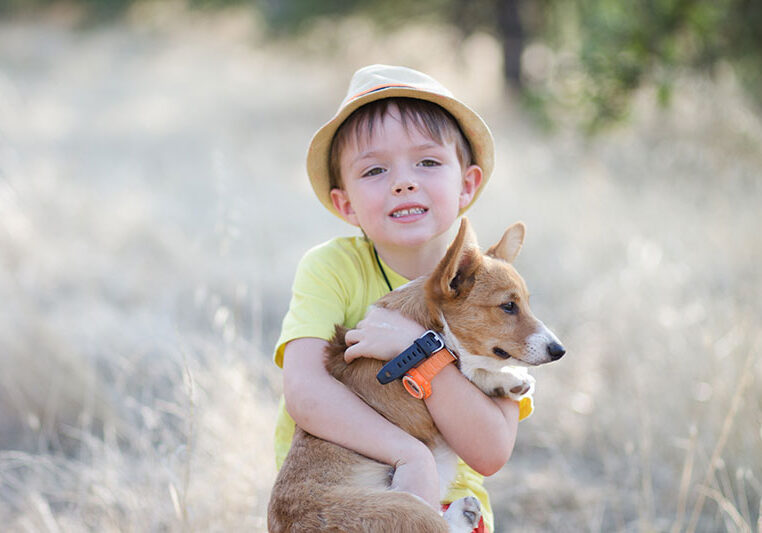Our daughter was just two years old when she started asking for a pet. Her requests ranged from wanting dogs, cats and rabbits to goldfish. We honored her wish for a dog, and now they are inseparable. They cuddle during story time and at bedtime. When she rides her bike, he runs alongside. When she falls down, he licks her cheeks. It is pure and uncomplicated love. She calls him her BFF.
A pet can have a positive impact on the whole family
Companionship is only one aspect of how pets can positively affect the lives of children. Dr. Patricia Bay, a licensed marriage and family therapist with a private practice in Redding, CA, says, “In my experience as a psychologist who has worked with children for almost 30 years, and as a mother and grandmother, I have often recommended a pet as a therapeutic intervention for struggling kids. For children who have been traumatized or are challenged in some way, owning a pet can have a positive impact on them and their whole family.”
In a recent study, researchers from Basset Medical Center, Dartmouth Medical School and the University of Oklahoma Health Sciences Center conducted an 18-month study with 643 children between 4 and 10 years old in a primary care setting. The study concluded that having a pet dog in the home was associated with a decreased probability of childhood anxiety. The researchers write, “Pet dogs could reduce childhood anxiety, particularly social and separation anxiety. A pet dog can stimulate conversation, an ice-breaking effect that can alleviate social anxiety. Companionship with a pet can alleviate separation anxiety and strengthen attachment.” Additionally, the researchers point out, “Anxiety disorders often start in childhood and persist into adulthood. Addressing sub-threshold conditions in primary care settings during childhood is a reasonable target for preventive interventions.”
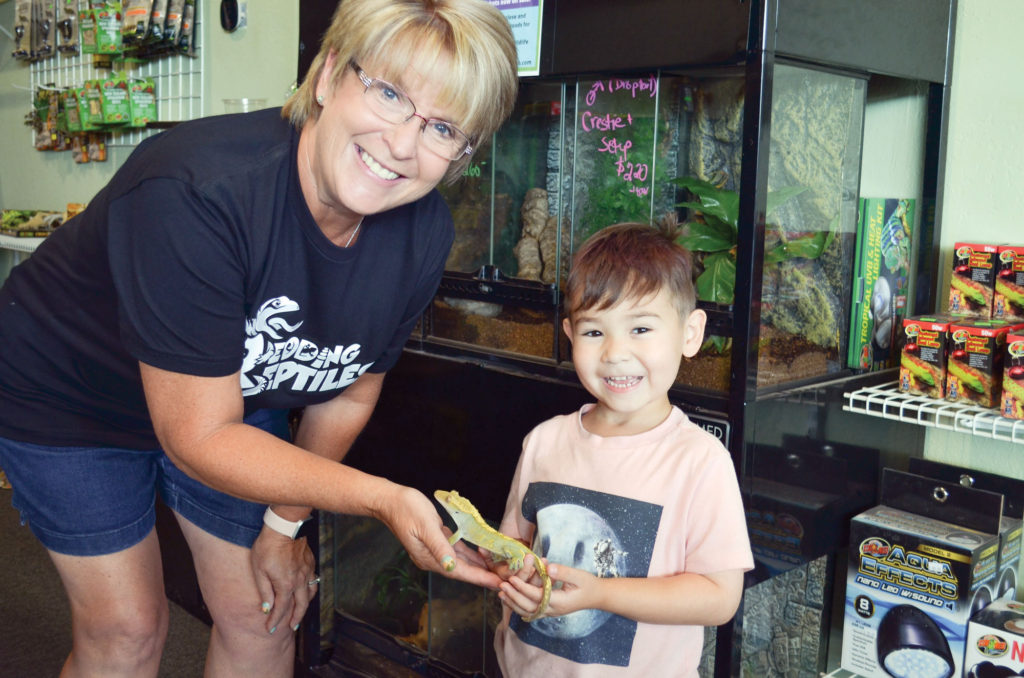

Sandra Dodge Streich, owner of Redding Reptiles, helps a young customer get acquainted with a new friend.
The power of a pet to make a person feel safe
Dr. Bay agrees: “We cannot understate the power of a pet to make a person feel safe. When a child struggles with anxiety, that child is often in a state of fear. A calm dog tells us that the world around us is safe at that moment. That translates, even unconsciously, to those nearby that ‘all is well.’”
Tiara Lavitt, graduate of Southern Oregon University, says, “Throughout most of my childhood I struggled with anxiety. For me that meant chronic stress and periods of feeling entirely powerless to whatever my physical experience would throw at me next. I would feel fine one moment, and the next moment I’d have an overwhelming fear that I might faint or vomit in public. As a defense mechanism, I would dissociate and leave my body, only making matters worse. Most of these instances would happen at school where I felt incredibly alone, while also feeling judged by what seemed like hundreds of surrounding faces.”
Having a pet is incredibly comforting — they just understand
“My saving grace was coming home to a dog and a cat, both of whom would help me return my awareness to my body the instant that I pet them. Having a pet that is happy to see you and is always there to listen and support you is incredibly comforting when you have anxiety. Especially, because actually speaking words isn’t necessary – they just understand.”
Licensed marriage and family therapist and certified neurOptimal trainer, Amy Truby, of Mt. Shasta Counseling and Neurofeedback, brings her dog to work as a way to ease the anxiety kids may have about going to counseling. Amy even allows kids to bring their own pets into sessions.
Pets are often a kid’s best friend
She says, “Pets are naturally cute and unconditionally loving. They often are a kid’s best friend. They don’t judge, they are not mean and they are always happy to see you. Many of the kids I see struggle with human interaction because they feel judged, are treated unkindly and are not always greeted with unconditional acceptance by peers, teachers, parents, etc. When kids feel accepted by their pets, it allows one of their basic needs to be met. Thus they feel calmer and more grounded.”
Although dogs are the top choice for therapy animals, they are not the only pets being used. Cats, rabbits, fish, horses, goats, alpacas, exotic birds, lizards, guinea pigs and many others can provide stress-reducing benefits.
Focus on calmness when choosing an animal
When choosing an animal, Dr. Bay recommends focusing on calmness. She says, “Remember that some animals sound like a good idea, but fearful pets can be harmful to an anxious child. It can increase a child’s anxiety instead of reducing it.” If owning an animal isn’t an option, Truby says, “Volunteering at an animal shelter is a great way to be involved. They feel like they are doing something positive – thus increasing confidence and a sense of accomplishment.”
Sandra Dodge Streich, owner of Redding Reptiles, says that snakes and ball pythons in particular, are good choices. “In the nine years that we have been in business selling reptiles, I have found that ball pythons are the best reptile for children and adults with anxiety, depression or on the autism spectrum. Though they are not fluffy and cuddly, their slow movement, calm disposition and ease in handling and care makes them a great choice. Several years ago, they were added to the list of animals approved to be a certified Emotional Support Animal (ESA) and we have sold/recommended many ball pythons for that reason with great success.”
Pets – big, small, short, tall, scaly or furry – can have powerful and positive impacts on a child struggling with anxiety. Tiara says that her childhood was forever changed because, “There is nothing like the unconditional love, support and pure acceptance that you get from a companion animal.”
Posted in: Animals, Health & Nutrition
Comment Policy: All viewpoints are welcome, but comments should remain relevant. Personal attacks, profanity, and aggressive behavior are not allowed. No spam, advertising, or promoting of products/services. Please, only use your real name and limit the amount of links submitted in your comment.
You Might Also Like...
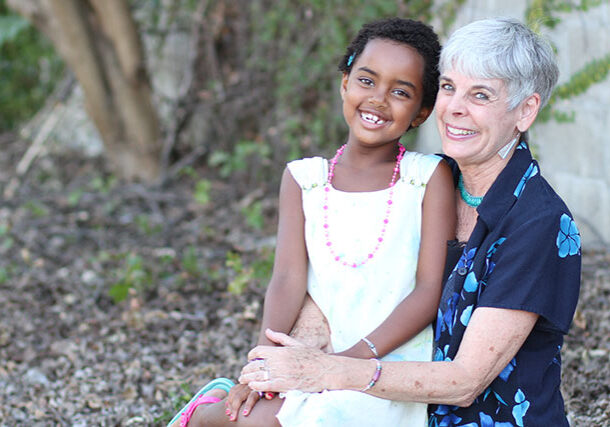
The Sandwich Generation: Balancing Child Care And Elder Care
In 1981, sociologist Dorothy A. Miller coined the term “sandwich generation” to refer to those who care for their aging parents while also supporting their own children. The definition became […]
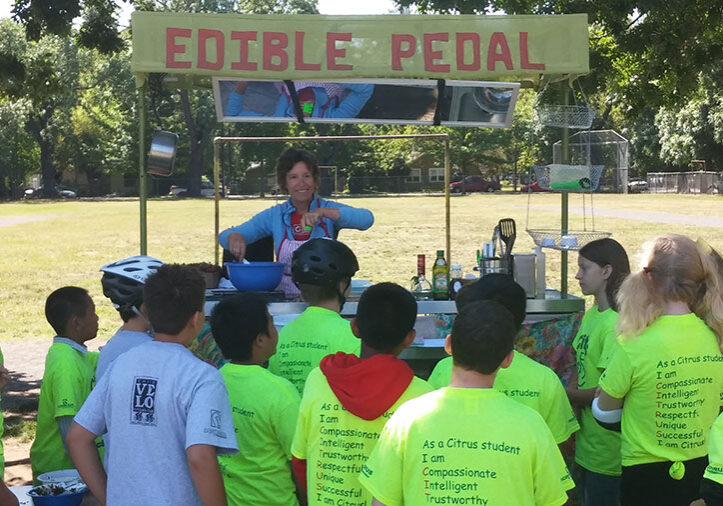
Bike Kitchen Peddles Good Nutrition
Looking for new ideas for preparing healthy foods? Keep an eye out for a pedal-driven kitchen at local farmers markets and community events in Chico. Called the Edible Pedal, the […]

The Campaign for Safe Cosmetics – Empowering Consumers to Make Healthy Choices
Last March celebrity tabloids were abuzz when toddler Vivienne Jolie-Pitt was spotted wearing lipstick in public. Observers were decidedly focused on the appropriateness of the 3-year-old’s “dress up” demeanor. Noticeably […]

May’s Bike to School Day: The Fun & Freedom of a Bicycle
Why do kids love to ride bicycles? With Bike Month celebrations taking place across the country in May, it’s a great time to take a ride with your favorite kids […]

